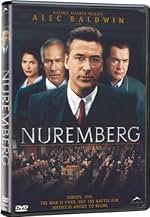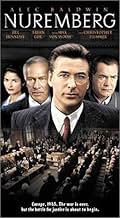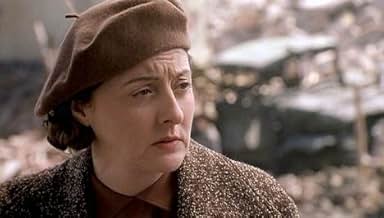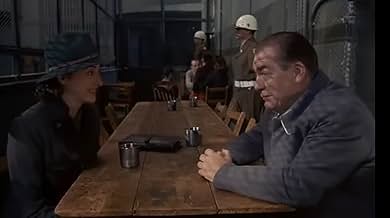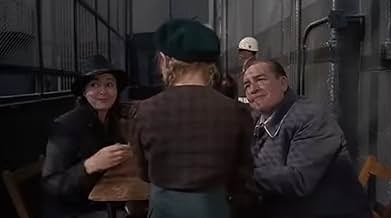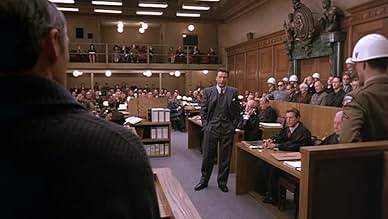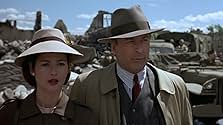Il racconto drammatizzato dei processi per crimini di guerra dopo la sconfitta della Germania nazista nella seconda guerra mondiale.Il racconto drammatizzato dei processi per crimini di guerra dopo la sconfitta della Germania nazista nella seconda guerra mondiale.Il racconto drammatizzato dei processi per crimini di guerra dopo la sconfitta della Germania nazista nella seconda guerra mondiale.
- Vincitore di 2 Primetime Emmy
- 10 vittorie e 33 candidature totali
Sfoglia gli episodi
Recensioni in evidenza
Magnificent film based on actual events with top-notch performances throughout proceeded by a decent star cast and specially by Baldwin , Cox , Plummer , Sydow , Heyerdahl and Len Cariou as supreme judge who presides over the trials , among others . A stimulating portrayal of the Nuremberg trials in which members of the German authorities were brought to response their crimes in the immediate post-war period .
Supreme court Justice , judge Robert H Jackson (Alec Baldwin) is asked to head up the prosecution and he decides to try a representative sample of third Reich leaders , including Hitler's 2º man Hermann Goering (Brian Cox) . The movie initiates with scenes of Núremberg , Germany , 1948 , the destruction of the war is clear everywhere , there Robert is driven through the ruined buildings . The court is formed by three judges to preside the trial against the Nazi chiefs for their complicity in Third Reich . As Robert Jackson in charge of Allied prosecution Nazi war who must resist political pressures and speeches against him , being helped by his assistant Elsie Douglas (Jill Hennessy) . In its opening declaration , the prosecution calls these defendants to account not for violation of due process or other constitutional violations but for killings , tortures , and cruelties committed during WWII . Considers to what extent an individual may be held accountable for actions committed of a superior officer . The accuser statements that the accused cannot claim ignorance that they should have known better for their high position and knowledge . And defenders argue the disobedience to the Fuehrer would have been choice between patriotism and treason for the justices with the subsequent firing squad . Finally the defending councillors explain that not only are the high staff on trial , so are the German people . They claim that the extremists are responsible , not the defendants . They say that very few Germans knew what was going on . Defense lawyers give us the uneasy feeling that the German people never really came to terms with their innocence or guilty . They claimed that the defendants stayed in their positions to keep things from getting worse . One of the more dramatic portions of the film centers around Prosecutor Robert Jackson submitted documents by which the judges and prosecutors had sent thousands to their deaths . A film was shown , a short-documentary is based on real events by means of photographs and stock-footage . As appears work camps are transformed into extermination centers to implement the policy of genocide thought at the Wannsee Conference . At the concentration camps was some minor industrial activity linked to the war effort but the main work was the execution of inmates . Millions of prisoners died in the concentration camps through mistreatment , disease, starvation, and overwork, or were executed as unfit for labor. More than six million Jews died in them, usually in gas chambers, although many were killed in mass shootings and by other means . As the documentary showed a gas chamber at Dachau , but it is a mistake because of it was never used, prisoners died from mistreatment or from execution by means other than gas . The archival footage shows tattooed skin , but Buchenwald prisoners with unusual tattoos were killed , then their skin was preserved for the tattoo collection of convicted war criminal Ilse Koch .
This is a graphic and thought-provoking account of the Nuremberg trials in which a group of high-level hierarchy are on trial , being judged in the immediate post-war period ; and subsequently brought to book by Joseph E. Persico , as this picture is based on his novel titled ¨Núremberg : Infamy on trial¨ . This consuming as well as provoking retelling contains some interesting trial scenes that generally work but there's also the needless byplay of a love story between prosecutor attorney Robert/Baldwin and his secretary/Hennessy . Prosecutor Robert H. Jackson is perfectly played by Alec Baldwin , he gives a very good acting for his impassioned portrayal of the accusation against the nasty Nazis . And also superb : Herbert Knaup as Albert Speer , Christopher Heyerdahl as Ernst Kaltenbrunner , Colm Feore as Rudolf Höß , Fournier as Reichsminister Alfred Rosenberg , Cloutier as admiral Karl Dönitz , Frank Moore as Hans Frank , René Gagnon as Reichsminister Arthur Seyß-Inquart , Benoît Girard as Joachim Von Ribbentrop , Dennis St John as Franz Von Papen , LaFortune as Rudolf Hess , Sam Stone as Julius Streicher and , of course , the always chilling Brian Cox . This deeply moving and powerful film was well -but not overly compelling- directed by Yves Simoneau . Rating : Good , better than average .
Supreme court Justice , judge Robert H Jackson (Alec Baldwin) is asked to head up the prosecution and he decides to try a representative sample of third Reich leaders , including Hitler's 2º man Hermann Goering (Brian Cox) . The movie initiates with scenes of Núremberg , Germany , 1948 , the destruction of the war is clear everywhere , there Robert is driven through the ruined buildings . The court is formed by three judges to preside the trial against the Nazi chiefs for their complicity in Third Reich . As Robert Jackson in charge of Allied prosecution Nazi war who must resist political pressures and speeches against him , being helped by his assistant Elsie Douglas (Jill Hennessy) . In its opening declaration , the prosecution calls these defendants to account not for violation of due process or other constitutional violations but for killings , tortures , and cruelties committed during WWII . Considers to what extent an individual may be held accountable for actions committed of a superior officer . The accuser statements that the accused cannot claim ignorance that they should have known better for their high position and knowledge . And defenders argue the disobedience to the Fuehrer would have been choice between patriotism and treason for the justices with the subsequent firing squad . Finally the defending councillors explain that not only are the high staff on trial , so are the German people . They claim that the extremists are responsible , not the defendants . They say that very few Germans knew what was going on . Defense lawyers give us the uneasy feeling that the German people never really came to terms with their innocence or guilty . They claimed that the defendants stayed in their positions to keep things from getting worse . One of the more dramatic portions of the film centers around Prosecutor Robert Jackson submitted documents by which the judges and prosecutors had sent thousands to their deaths . A film was shown , a short-documentary is based on real events by means of photographs and stock-footage . As appears work camps are transformed into extermination centers to implement the policy of genocide thought at the Wannsee Conference . At the concentration camps was some minor industrial activity linked to the war effort but the main work was the execution of inmates . Millions of prisoners died in the concentration camps through mistreatment , disease, starvation, and overwork, or were executed as unfit for labor. More than six million Jews died in them, usually in gas chambers, although many were killed in mass shootings and by other means . As the documentary showed a gas chamber at Dachau , but it is a mistake because of it was never used, prisoners died from mistreatment or from execution by means other than gas . The archival footage shows tattooed skin , but Buchenwald prisoners with unusual tattoos were killed , then their skin was preserved for the tattoo collection of convicted war criminal Ilse Koch .
This is a graphic and thought-provoking account of the Nuremberg trials in which a group of high-level hierarchy are on trial , being judged in the immediate post-war period ; and subsequently brought to book by Joseph E. Persico , as this picture is based on his novel titled ¨Núremberg : Infamy on trial¨ . This consuming as well as provoking retelling contains some interesting trial scenes that generally work but there's also the needless byplay of a love story between prosecutor attorney Robert/Baldwin and his secretary/Hennessy . Prosecutor Robert H. Jackson is perfectly played by Alec Baldwin , he gives a very good acting for his impassioned portrayal of the accusation against the nasty Nazis . And also superb : Herbert Knaup as Albert Speer , Christopher Heyerdahl as Ernst Kaltenbrunner , Colm Feore as Rudolf Höß , Fournier as Reichsminister Alfred Rosenberg , Cloutier as admiral Karl Dönitz , Frank Moore as Hans Frank , René Gagnon as Reichsminister Arthur Seyß-Inquart , Benoît Girard as Joachim Von Ribbentrop , Dennis St John as Franz Von Papen , LaFortune as Rudolf Hess , Sam Stone as Julius Streicher and , of course , the always chilling Brian Cox . This deeply moving and powerful film was well -but not overly compelling- directed by Yves Simoneau . Rating : Good , better than average .
My first impression of this film was that it was excellently done. It provoked my curiosity and I am glad to say the film held up under my further investigation of the trials.
The accurate representation of the grayness of a subject most would consider black and white was particularly courageous. It would be easy to paint the Nazis as monsters without souls, but so often terrible things are done by perfectly ordinary people. In fact that is what is so terrible about people's actions in WWII. Malevolence would certainly be easier to accept than what this film shows was at the source of the Nazi behavior -- indifference and lack of empathy. Who hasn't felt indifference toward someone they met in everyday life, the cashier who was too slow, the person in the car ahead, the telemarketer?
The acting was excellent, particularly Brian Cox, who showed us how well charm can mask evil. I did not think Goering was white-washed. This was shown most clearly in his pathetic attempt to shrug off the concentration camp film. Even his manipulative skill couldn't ease that shock, and his American friend was silent. If Alex Baldwin pumped up his drama a little, well, take a look at transcripts of the trial, which are drier than the Sahara. The use of documents was extensive during the trial and how often does the layperson want to hear that? The use of the concentration camp film was a cold dash of water in the face of such dryness. Some other comments question the inclusion of the relationship between Jackson and his secretary. I didn't see it as a "love story", but more as an "adultery story" used to show on a more personal level that despite his side's claim to superior "morals" Jackson was also weak. I think the Soviet involvement and the Polish massacre was left out because it would have been too long to include in all its convolutions. It is an interesting part of the story, however, so I recommend researching it.
I was glad to see on the comments that those who know more than I pointed out its accuracy. Too rarely does Hollywood actually attempt that.
The accurate representation of the grayness of a subject most would consider black and white was particularly courageous. It would be easy to paint the Nazis as monsters without souls, but so often terrible things are done by perfectly ordinary people. In fact that is what is so terrible about people's actions in WWII. Malevolence would certainly be easier to accept than what this film shows was at the source of the Nazi behavior -- indifference and lack of empathy. Who hasn't felt indifference toward someone they met in everyday life, the cashier who was too slow, the person in the car ahead, the telemarketer?
The acting was excellent, particularly Brian Cox, who showed us how well charm can mask evil. I did not think Goering was white-washed. This was shown most clearly in his pathetic attempt to shrug off the concentration camp film. Even his manipulative skill couldn't ease that shock, and his American friend was silent. If Alex Baldwin pumped up his drama a little, well, take a look at transcripts of the trial, which are drier than the Sahara. The use of documents was extensive during the trial and how often does the layperson want to hear that? The use of the concentration camp film was a cold dash of water in the face of such dryness. Some other comments question the inclusion of the relationship between Jackson and his secretary. I didn't see it as a "love story", but more as an "adultery story" used to show on a more personal level that despite his side's claim to superior "morals" Jackson was also weak. I think the Soviet involvement and the Polish massacre was left out because it would have been too long to include in all its convolutions. It is an interesting part of the story, however, so I recommend researching it.
I was glad to see on the comments that those who know more than I pointed out its accuracy. Too rarely does Hollywood actually attempt that.
Quite a few reviewers seem to be taken by the historicity of this movie. It's true that many of the details are correct - but it is also true that many others are wildly incorrect. The most egregious one is the romantic liaison between Justice Jackson and his assistant. I guess that the producers introduced the romantic element for the sake of a wider appeal, but the fact is that, in light of the actual events, this looks ridiculous. Which is a shame, for the movie would have been far more valuable without that silliness. It's mostly because of this that I don't think that it deserves more than 5 points. The bright sides are Brian Cox's and Michael Ironside's performances, and also, but to a lesser extent, Christopher Plummer's and Matt Craven's. Alec Baldwin delivers the same kind of underwhelming performance that he usually does, and Jill Hennessy does whatever she can with her inane and fictitious part.
In summary, it could have been a good movie, but it is just a decent one.
In summary, it could have been a good movie, but it is just a decent one.
This is a strange subject for a modern TV series designed to entice an audience to whom World War II is as distant as the Pelopenesian Wars. Yet this is a tough, well produced, historically accurate and thoroughly compelling film. Brian Cox steals the show with a masterful recreation of Hermann Goering as a beguiling rogue. And the production techniques excel, for example the sound track as silent film of the concentration camps is shown to the trial. It puts the horror in context without exploiting it or sensationalizing it. A brilliant piece of historical film making.
Hidden inside this purported battle between surviving top Nazi Hermann Goering and American prosecutor Judge Robert Jackson is, I think, the adaptation the writer probably wanted to do - the story of psychologist G. M. Gilbert and his backstage verbal tusslings with men who either refused to acknowledge any guilt (Goering, Streicher) or conversely were overflowing with it (Frank, Speer).
When you see Alec Baldwin appear a second time in the credits, as Executive Producer, you feel that Nuremberg was probably conceived as a vanity project for him. Fortunately it is quite easy to let the early scenes of the Court's setup just wash over you, and of course Jill Hennessey is always easy on the eyes. Much of the first half of the first episode is more or less soap opera. Jackson has to persuade Judge Biddle to go to Nuremberg, then to relinquish the Presidency of the court to the British. The bantering relationship with his secretary (Hennessey) serves as a prelude to their becoming lovers during their time in Germany.
At this point Hermann Goering appears (the great Brian Cox on top form), totally dominating the trial, totally dominating this mini-series, and your attention is grasped and held. Cox almost wipes Baldwin off the screen. Unfortunately it's very hard not to gain a great deal of sympathy for Goering, particularly when he is with his family, or in the heart-to-heart chats with his G. I. prison guard, Tex. We see Goering as he undoubtedly saw himself, but in reality he wasn't like that at all. The Nuremberg trial and the general travails of imprisonment were an excellent opportunity for him to smarten himself up: prior to his arrest he had become a dissolute and overweight drug addict. Unfortunately no sign of this weakness of character was carried over into the script, leaving an impression of Goering as a noble, principled man - irrespective of whether you agreed with his principles.
Also very watchable was Matt Craven in the role of Gilbert the aforementioned psychologist, and Christopher Plummer as British prosecutor David Maxwell-Fyfe (although the real Maxwell-Fyfe was the younger prosecutor, not an elder mentor as depicted here). Particularly gratifying is the scene in which Maxwell-Fyfe tells Jackson that "your documentary approach is legally impeccable - but as drama it's absolutely stultifying" - which might stand as an apt description of Baldwin's part in this series.
A last little curiosity, and not to make any personal remarks about Herbert Knaup, but I did find it strange that they cast Knaup, a slightly odd-looking actor, to play Albert Speer, by fairly common consent the handsomest and most photogenic of all the Nazi leaders, particularly as Speer was portrayed here in a sympathetic light. Other than Knaup, many of the actors were very close in looks to their real-life counterparts, most notably Roc LaFortune as Rudolf Hess, almost a living double.
When you see Alec Baldwin appear a second time in the credits, as Executive Producer, you feel that Nuremberg was probably conceived as a vanity project for him. Fortunately it is quite easy to let the early scenes of the Court's setup just wash over you, and of course Jill Hennessey is always easy on the eyes. Much of the first half of the first episode is more or less soap opera. Jackson has to persuade Judge Biddle to go to Nuremberg, then to relinquish the Presidency of the court to the British. The bantering relationship with his secretary (Hennessey) serves as a prelude to their becoming lovers during their time in Germany.
At this point Hermann Goering appears (the great Brian Cox on top form), totally dominating the trial, totally dominating this mini-series, and your attention is grasped and held. Cox almost wipes Baldwin off the screen. Unfortunately it's very hard not to gain a great deal of sympathy for Goering, particularly when he is with his family, or in the heart-to-heart chats with his G. I. prison guard, Tex. We see Goering as he undoubtedly saw himself, but in reality he wasn't like that at all. The Nuremberg trial and the general travails of imprisonment were an excellent opportunity for him to smarten himself up: prior to his arrest he had become a dissolute and overweight drug addict. Unfortunately no sign of this weakness of character was carried over into the script, leaving an impression of Goering as a noble, principled man - irrespective of whether you agreed with his principles.
Also very watchable was Matt Craven in the role of Gilbert the aforementioned psychologist, and Christopher Plummer as British prosecutor David Maxwell-Fyfe (although the real Maxwell-Fyfe was the younger prosecutor, not an elder mentor as depicted here). Particularly gratifying is the scene in which Maxwell-Fyfe tells Jackson that "your documentary approach is legally impeccable - but as drama it's absolutely stultifying" - which might stand as an apt description of Baldwin's part in this series.
A last little curiosity, and not to make any personal remarks about Herbert Knaup, but I did find it strange that they cast Knaup, a slightly odd-looking actor, to play Albert Speer, by fairly common consent the handsomest and most photogenic of all the Nazi leaders, particularly as Speer was portrayed here in a sympathetic light. Other than Knaup, many of the actors were very close in looks to their real-life counterparts, most notably Roc LaFortune as Rudolf Hess, almost a living double.
Lo sapevi?
- BlooperAt the end of the trial, Field Marshall Wilhelm Keitel is referred to as "Admiral Keitel."
- Citazioni
Reichsmarschall Hermann Wilhelm Göring: One German, a fine man. Two Germans, a bund. Three Germans, a war. One Englishman, an idiot. Two Englishmen, a club. Three Englishmen, an Empire.
- ConnessioniFeatured in The 58th Annual Golden Globe Awards 2001 (2001)
- Colonne sonoreDeep in the Heart of Texas
Written by June Hershey and Don Swander
Performed by cast
Melody Lane Music c/o Peermusic International
I più visti
Accedi per valutare e creare un elenco di titoli salvati per ottenere consigli personalizzati
- How many seasons does Nuremberg have?Powered by Alexa
Dettagli
- Data di uscita
- Paesi di origine
- Sito ufficiale
- Lingue
- Celebre anche come
- Nuremberg
- Luoghi delle riprese
- Aziende produttrici
- Vedi altri crediti dell’azienda su IMDbPro
- Tempo di esecuzione
- 1h 30min(90 min)
- Colore
- Mix di suoni
- Proporzioni
- 1.85 : 1
Contribuisci a questa pagina
Suggerisci una modifica o aggiungi i contenuti mancanti



